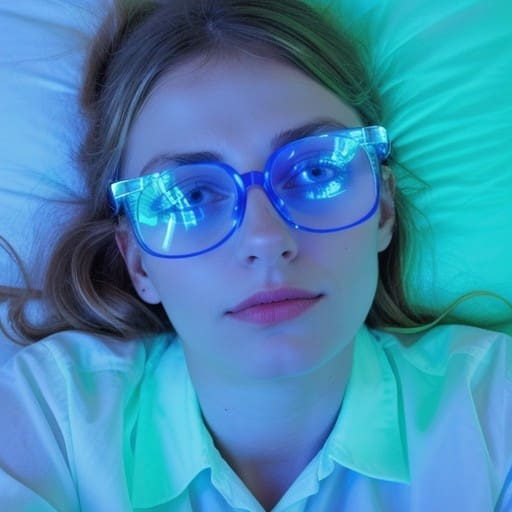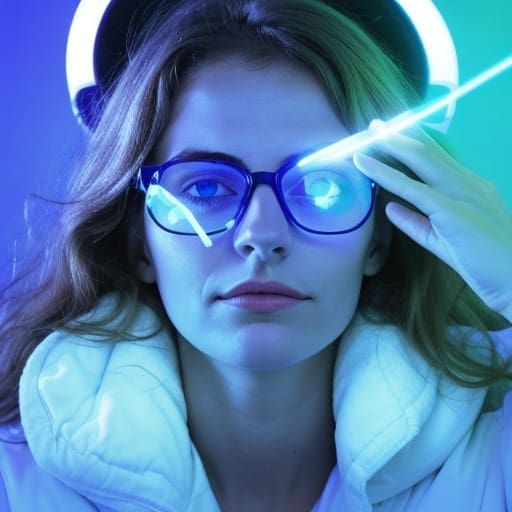With the sudden increase in modern technology, people have begun to notice how much blue light can affect your sleep.
Because of this, new inventions have been created to help counter the influx of blue light.

If you’ve looked into this topic before, there’s no doubt you’ve probably heard of blue light glasses.
These special glasses are fitted with lenses that help protect you and relax your body for a good night’s sleep.
But how exactly do they work? Why is it that they make you feel sleepy? If you find yourself wondering how this works, then you’ve arrived at the right article!
We’re going to be taking you through everything to do with blue light glasses—how they were first created, how blue light affects your brain, and how these glasses help.
We’re going to make sure to go in-depth on the science behind this process and whether or not it’ll be helpful for you.
Okay, so first up, we’re going to go deep into the science behind blue light.
You’ve likely heard of blue light before, with many modern articles and books warning of the dangers. But what exactly is blue light, and what do we know about it?
Light is a spectrum, and there are a lot of different types, but there are only a few that are visible to our eyes. Generally, the higher the energy of the light, the less likely we are to see it.
Visible light from red through yellow to green is the easiest on our eyes. If you go a little higher up the spectrum, you get blue light, and then finally, you’ll end up at ultraviolet, which our eyes are no longer able to see.
UV light is more often referred to as invisible radiation.
The physics of light are a complex topic, but the main thing you need to know about blue light is that it is the highest-energy kind of visible light.
Because of this, when you look at blue light, it will penetrate the retina at the back of your eye. This isn’t a bad thing in small doses, and we get a regular dose of it from the sun.
This is why human sleep patterns are like they are. But here’s the thing: with the advent of new technology like phones and other screens, we are now interacting with far too much blue light, often at times when we shouldn’t naturally be exposed to it at all.
This is one of the reasons why, when you fly to another country, your sleep pattern gets all scrambled—you’re exposed to the blue light of the sun when you shouldn’t be.
The kind of blue light that you might encounter on a screen tends to come from LED or OLED lighting.
It typically functions within the 350–500 nanometer range (nanometers being the measurement we use to describe light).
In recent years, it appears that this range of light can be harmful to you.
As a child, you may have heard the words “don’t stand so close to the TV, else your eyes will go square.”
While your eyes don’t go square, it’s been well known for a long time that excessive exposure to screens can damage your eyesight.
But now we’re starting to understand how excessive exposure to blue light can affect mental health.
Over the last 10 years, blue light has been linked to several harmful issues, including disrupting circadian rhythm, hormone secretion, and neurotransmission.
All of these can lead to mental health problems such as insomnia, depression, and anxiety-based disorders. There have been several studies on this subject including a recent study on the influence of blue light on sleep, performance and well being in young adults.
There’s still a lot of research that needs to be done before we can confidently measure how harmful blue light can be, but the link between blue light and disruption to sleep cycles is well documented.
And that’s where blue-light glasses come in!

Blue light glasses, otherwise known as blocking glasses, are specially made to reduce the amount of blue light that penetrates the retina.
They are made of special lenses that filter blue light rays with the goal of stopping them from entering your eye.
You can usually recognize a pair of blue-light-blocking glasses by their sepia tint, which is used to counteract blue light.
You may be wondering if there is scientific evidence to support the effectiveness of blue-light glasses.
At the moment there isn’t enough information to make real conclusions about how much they help, but there are links between reducing blue light and maintaining healthy sleep cycles.
Some of the purported benefits of blue light glasses include headache prevention, dry eye prevention, help with eye strain, and help with sleeping.
We’re going to dive into more detail on these below.
This is probably the main reason that people buy blue-light glasses. They are typically worn for three hours before bed.
Gamers, in particular, can suffer from this, so it’s a good idea to wear something that will dim the lights during extended sessions.
Whilst the evidence for the effects of blue light is still growing, we are beginning to understand how much this can affect your health.
If you’re having trouble sleeping and find yourself being exposed to excessive levels of blue light, then it could be a good idea to try out blue light glasses.
A lot of people find them very helpful, particularly before bed.
We hope this article has helped you to understand the details of blue light exposure and how it can harm you.
If you’re having trouble sleeping then screen time – especially before bed – is one of the first things you should consider combatting!
This can be really hard in the modern world, but with small things like blue light glasses, you might be able to find ways to minimize it!
We wish you the best of luck and hope that your sleep is fixed soon!